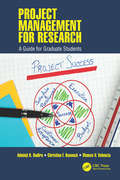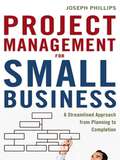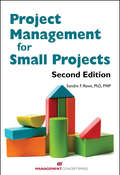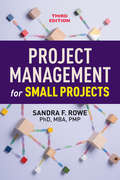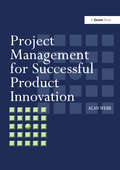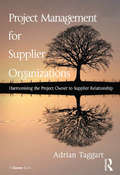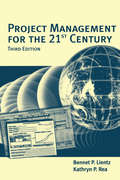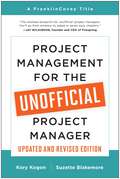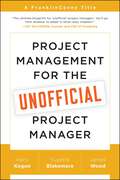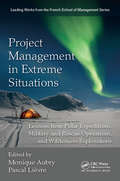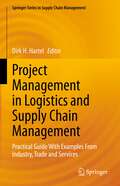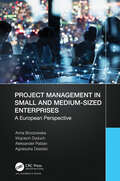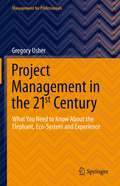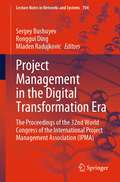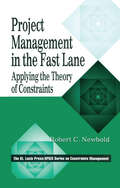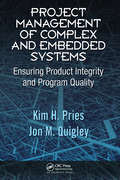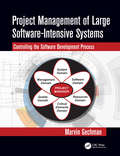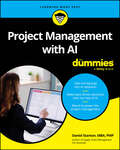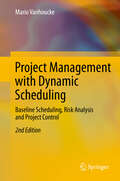- Table View
- List View
Project Management for Research: A Guide for Graduate Students (Systems Innovation Book Series)
by Adedeji B. Badiru Vhance V. Valencia Christina F. RusnockGraduate research is a complicated process, which many undergraduate students aspire to undertake. The complexity of the process can lead to failures for even the most brilliant students. Success at the graduate research level requires not only a high level of intellectual ability but also a high level of project management skills. Unfortunately, many graduate students have trouble planning and implementing their research. Project Management for Research: A Guide for Graduate Students reflects the needs of today’s graduate students. All graduate students need mentoring and management guidance that has little to do with their actual classroom performance. Graduate students do a better job with their research programs if a self-paced guide is available to them. This book provides such a guide. It covers topics ranging from how to select an appropriate research problem to how to schedule and execute research tasks. The authors take a project management approach to planning and implementing graduate research in any discipline. They use a conversational tone to address the individual graduate student. This book helps graduate students and advisors answer most of the basic questions of conducting and presenting graduate research, thereby alleviating frustration on the part of both student and advisor. It presents specific guidelines and examples throughout the text along with more detailed examples in reader-friendly appendices at the end. By being more organized and prepared to handle basic research management functions, graduate students, along with their advisors, will have more time for actual intellectual mentoring and knowledge transfer, resulting in a more rewarding research experience.
Project Management for Small Business: A Streamlined Approach from Planning to Completion
by Joseph PhillipsProject management can help companies become more efficient and profitable. But classic project management models often prove too cumbersome for smaller businesses with limited staff resources, tight budgets, and next to no time to devote to learning complex methodologies. These smaller enterprises need the core principles and techniques of project management in a streamlined package. Project Management for Small Business offers simple, repeatable practices for planning, executing, and controlling projects in smaller environments in which one team member may wear multiple hats. Readers will learn how to: ò Define project requirements and scope ò Create a project schedule based on resource availability ò Estimate, budget, and control project costs ò Identify and minimize project risks ò Manage workflow ò Communicate effectively ò Control project change ò And more. Grounded in real-world experience, this practical guide skips the complicated theory and goes straight to the heart of what it really takes to make a project a success.
Project Management for Small Projects
by Sandra R. Rowe PhD, PMPImportant New Tools for Managing Your Small Projects As Part of a Larger Program!The first edition of Project Management for Small Projects introduced project management processes, tools, and techniques that are scalable and adaptable to small projects. Project managers learned a structured, disciplined approach to managing small projects sensibly and realistically. This new edition is updated throughout to reflect the PMBOK® Guide, Fifth Edition, balancing the particular needs of small projects with the project management methodology.Project managers who are proficient at managing and leading their own projects are increasingly being called upon to work collaboratively with other project managers to lead components of a program. In addition to knowing how to manage processes and how to lead the team, project managers must now also know how to collaborate and share knowledge with other project managers. A new chapter on program management offers important insights and guidance for managing a group of related small projects in a coordinated way to obtain benefits and control not available from managing them individually.
Project Management for Small Projects, Third Edition
by Sandra F. RoweProject Management for Small Projects shows you how to tailor bureaucratic planning processes to a sleek minimum while still keeping your project running like a well-oiled machine.The Project Management Body of Knowledge (PMBOK) recommends tailoring the planning processes to fit the size of your project, but it doesn't always fully explain how. Using too much process can be as detrimental to a project as not using a process at all. For years, this book has helped managers of small projects design processes that are neither too big nor too small but "just right." It provides simplified but compliant tools for immediate use in managing small projects. And since most small projects tend to be similar in structure or outcome, a template for one project can be used for future projects. This new edition of Project Management for Small Projects has been updated to align with the latest PMBOK. In addition, there is new material on Agile project management and on the essential leadership skills for small project managers.
Project Management for Successful Product Innovation
by Alan WebbThis comprehensive book provides a complete guide to managing projects involving the development of new products. It aims to give the practising project manager an insight into the many processes that are involved in handling one of the most complex of industrial activities. The book is arranged in a logical sequence covering the development of project management, project management structures, aspects of planning, monitoring and control, economics and value management, design management, intellectual property issues and production start-up. Particular emphasis has been given to risk management which is recognized as both a difficult subject and also one of growing importance to today’s project manager, especially in product innovation. A complete explanation is given of the latest and most relevant techniques together with guidance as to where and how they should be applied. Where software tools are available these are named and, in some cases, brief descriptions are included; in all cases contact details of the vendors are provided.
Project Management for Supplier Organizations: Harmonising the Project Owner to Supplier Relationship
by Adrian TaggartConventionally, the literature on project management presents the story from the project client, or Owner’s, perspective. Project Management for Supplier Organizations turns this on its head and explores the challenges and remedies from the perspective of the vendors providing the necessary goods and services to a project. It explains the likely impact on the structure, culture, and procedures of Suppliers and identifies the additional competences they may require. It offers new insights, frameworks and models, in particular a new Supplier Organization’s Project Lifecycle Model, that integrate the role of the Supplier as a member of the Owner’s project team with their own necessary commercial activities such as marketing and selling. For Suppliers, this unlocks the contents of the various Bodies of Knowledge, by showing how and where the tools and techniques of project management apply to their particular role. The text explores in some detail the shared and divergent interests of Suppliers and Owners and shows how a well thought-out and carefully executed procurement process maximises the former and diminishes the latter. Such an insight is equally valuable for any Owner Organization. Adrian Taggart’s book provides a refreshing and essential perspective. For Suppliers managing their role in a project, it offers a real insight and an urgent set of priorities. For Owners it shows how best they can work with their suppliers to mutual benefit.
Project Management for the 21st Century
by Bennet Lientz Kathryn ReaThe challenge of managing projects is to combine the technology of the future with lessons from the past. In the Third Edition of Project Management for the 21st Century, noted authors Bennet Lientz and Kathryn Rea provide a modern, proven approach to project management. Properly applied without massive administrative overhead, project management can supply structure, focus, and control to drive work to success.Third Edition revisions include: 35% new material; three new chapters on risk management, international and multinational projects, project culture; entire text rewritten to take advantage of the Web and Internet tools; new appendix covering web sites; additional materials on "what to do next"; more feedback from readers and lessons learned.
Project Management for the Oil and Gas Industry: A World System Approach (Systems Innovation Book Series)
by Adedeji B. Badiru Samuel O. OsisanyaThis book presents an integrated approach to project management for oil and gas projects. It covers concepts, tools, and techniques of project management based on the elements of the Project Management Body of Knowledge. The book also contains case examples of applications of project management tools and techniques to real-life project scenarios. The book is intended to serve as a reference book for planners, project operators, stakeholders, designers, project managers, business managers, consultants, project analysts, senior executives, project team members, members of project management office, project customers, functional managers, trainers, and researchers.
Project Management for the Oil and Gas Industry: Agile Systems and Environmental Concerns (Systems Innovation Book Series)
by Adedeji B. BadiruA lot of managerial finessing is needed to handle the present era of the operations of the oil and gas industry, under the pressure of environmental issues. The recent emergence of the techniques of Agile systems offers a tremendous collection of new approaches for addressing the managerial impediments to oil and gas operations.Agile Systems and Environmental Concerns covers how Agile systems are based on principles that emphasize team collaboration, continual planning, and continual learning, thus making an operation more responsive and adaptive to operational changes. Agile is an iterative approach to project management that helps teams achieve results faster and more accurately.This volume contains a variety of Agile management tools and techniques to address communication, cooperation, and coordination requirements related to risk management and environmental issues, ideal for practitioners, designers, consultants, contractors, risk and quality managers, along with project managers and systems engineers involved in oil and gas projects, and related industries.
Project Management for the Oil and Gas Industry: Systems Engineering and Technology (Systems Innovation Book Series)
by Adedeji B. BadiruThis volume focuses on the broad scope of systems engineering and recent energy technology developments as they relate to the oil and gas industry, which remains a lifeline to communities around the world. In 2015, the United Nations adopted the 17 Sustainable Development Goals (SDGs) to, among other things, curtail the catastrophe that will befall the world from the increasing menace of global warming and climate change. The best way to achieve most or all the goals is to use a comprehensive systems-based approach, specifically, leveraging the efficacy of systems engineering for project management in the oil and gas industry.Systems Engineering and Technology presents the systems-based interrelationships of energy generation, transmission, distribution, and consumption. This volume will expand on elements of the first edition to encapsulate new developments in technologies, from a systems approach. In tackling climate change problems, both qualitative and quantitative approaches must be pursued. This allows us to bring in technological approaches as well as human-centered social considerations.The premise of this volume is that a systems engineering approach is the key to making the desired progress, where renewables and conventional oil and gas can coexist. This book contains a mix of technical, social, economic, engineering, and political considerations ideal for practitioners, designers, consultants, contractors, risk and quality managers, along with project managers and systems engineers involved in oil and gas projects, and related industries.
Project Management for the Pharmaceutical Industry
by Laura Brown Tony GrundyThe pharmaceutical industry has encountered major shifts in recent years, both within the industry, and in its external environment. The cost of healthcare rising due to an ageing population, the intensification of regulatory requirements and mergers within the industry have led to an increased need for restructuring, cost reduction and culture change projects. Project management is the key to addressing these needs, and also to effective drug development. Given the costs of development and the critical issue of 'time to market', project management techniques - appropriately used - are a key factor in bringing a drug to market. In this book, Laura Brown and Tony Grundy's pharmaceutical expertise and experience offers the reader a guide to the most relevant project management tools and techniques and how to rigorously apply them in the pharmaceutical industry. The authors cover the technical, strategic and human aspects of project management, including contingency planning, simulation techniques and different project options. Complete with decision-tree diagrams, checklists, exercises and a full glossary, Project Management for the Pharmaceutical Industry provides clinical research, drug development and quality assurance managers or directors with a one-stop reference for successfully managing pharmaceutical projects. The text has been revised for this edition and now includes some additional material on risk management.
Project Management for the Unofficial Project Manager (Updated and Revised Edition)
by Kory Kogon Suzette BlakemoreNo project management training? No problem! In today&’s workplace, employees are routinely expected to coordinate and manage projects. Yet, chances are, you aren&’t formally trained in managing projects—you&’re an unofficial project manager. FranklinCovey experts Kory Kogon and Suzette Blakemore understand the importance of leadership in project completion and explain that people are crucial in the formula for success. This updated and revised edition of Project Management for the Unofficial Project Manager offers practical, real-world insights for effective project management and guides you through the essentials of the value, people, and project management process: Scope Plan Engage Track and Adapt Close If you&’re struggling to ensure multiple projects are finished with high value and on time, this book is for you. If you manage projects without the benefit of a team, this book is also for you. Change the way you think about project management—"project manager" may not be your official title, but with the right strategies, you can excel in this project economy.
Project Management for the Unofficial Project Manager: A FranklinCovey Title
by James Wood Kory Kogon Suzette BlakemoreNo project management training? No problem! In today's workplace, employees are routinely expected to coordinate and manage projects. Yet, chances are, you aren't formally trained in managing projects—you're an unofficial project manager. FranklinCovey experts Kory Kogon, Suzette Blakemore, and James Wood understand the importance of leadership in project completion and explain that people are crucial in the formula for success. Project Management for the Unofficial Project Manager offers practical, real-world insights for effective project management and guides you through the essentials of the people and project management process: Initiate Plan Execute Monitor/Control Close Unofficial project managers in any arena will benefit from the accessible, engaging real-life anecdotes, memorable &“Project Management Proverbs," and quick reviews at the end of each chapter. If you're struggling to keep your projects organized, this book is for you. If you manage projects without the benefit of a team, this book is also for you. Change the way you think about project management—"project manager" may not be your official title or necessarily your dream job, but with the right strategies, you can excel.
Project Management from Simple to Complex Version 1.1
by Russell Darnall John M. PrestonIn a world that is becoming more virtual, more global, and more complex, the project manager's ability to function in this environment becomes critical to the success of the project. Project Management from Simple to Complex explores project management within this complex, virtual, and global environment. This is not a standard textbook that was adapted to the new publishing paradigm; it was designed from the beginning to utilize its capabilities. The book is written in collaboration by an expert in Project Management—Russell Darnall—and an expert in writing instructional textbooks and using technology for communicating online—John Preston—to create a unique learning environment that prepares students to manage projects in a global, multicultural, and online environment. Project Management from Simple to Complex features a new model for managing projects, as well as, exploration into the personal dynamics of project management and the role those dynamics play in project outcomes.
Project Management in Construction (The Leading Construction Series)
by Dennis LockThe one thing that all well-run, profitable construction projects have in common is that they benefit from good project managers. People who have the skills to plan the project, manage it and keep it on track whenever tight timescales, costs, people or other difficulties threaten to derail it. The good news is that there is no secret art to project management. These are the skills that any manager can learn and use. Project Management in Construction is a practical, easy-to-read guide to defining, organizing, planning, and executing a construction project so that it is completed to the satisfaction of the principal stakeholders. The book is part of the Leading Construction Series co-published by Gower and CITB-ConstructionSkills. The Leading Construction Series is part of a CITB-ConstructionSkills initiative to develop management skills within the industry. The books in this series are designed to be essentially practical, with a firm grounding in the construction industry.
Project Management in Extreme Situations: Lessons from Polar Expeditions, Military and Rescue Operations, and Wilderness Exploration (Leading Works from the French School of Management)
by Monique Aubry Pascal LievreThe growing complexity of projects today, as well as the uncertainty inherent in innovative projects, is making obsolete traditional project management practices and procedures, which are based on the notion that much about a project is known at its start. The current high level of change and complexity confronting organizational leaders and managers requires a new approach to projects so they can be managed flexibly to embrace and exploit change. What once used to be considered extreme uncertainty is now the norm, and managing planned projects is being replaced by managing projects as they evolve. <P><P>Successfully managing projects in extreme situations, such as polar and military expeditions, shows how to manage successfully projects in today’s turbulent environment. Executed under the harshest and most unpredictable conditions, these projects are great sources for learning about how to manage unexpected and unforeseen situations as they occur. This book presents multiple case studies of managing extreme events as they happened during polar, mountain climbing, military, and rescue expeditions. <P><P>A boat accident in the Artic is a lesson on how an effective project manager must be ambidextrous: on one hand able to follow plans and on the other hand able to abandon those plans when disaster strikes and improvise new ones in response. Polar expeditions also illustrate how a team can use "weak links" to go beyond its usual information network to acquire strategic information. Fire and rescues operations illustrate how one team member’s knowledge can be transferred to the entire team. Military operations provide case material on how teams coordinate and make use of both individual and collective competencies. <P><P>This groundbreaking work pushes the definitions of a project and project management to reveal new insight that benefits researchers, academics, and the practitioners managing projects in today’s challenging and uncertain times.
Project Management in Logistics and Supply Chain Management: Practical Guide With Examples From Industry, Trade and Services (Springer Series in Supply Chain Management #15)
by Dirk H. HartelThis practice-oriented guide comprehensively describes the basics of planning and implementing project management in logistics and supply chain management. It also presents a range of methods and tools for assessing project risks and monitoring projects. Containing ten detailed and practical examples involving Germany-based global players like Porsche, Würth, Continental and SME, the book shares valuable and well-founded insights into systematic project management. As such, it is chiefly intended for career starters, career changers and students in the field of logistics and supply chain management.
Project Management in Small and Medium-Sized Enterprises: A European Perspective
by Anna Brzozowska Wojciech Dyduch Aleksander Pabian Agnieszka DziedzicThe growing importance of projects in organizations, combined with difficulties in their implementation, is accompanied by the need for professional knowledge in the field of project management. It results from the complexity of project management problems and the difficulty of knowledge that must be applied. However, surprisingly little is known about this topic, especially in the context of European small and medium-sized enterprises (SMEs). Project Management in Small and Medium-Sized Enterprises: A European Perspective attempts to fill this specific research gap. The book analyses the process of managing projects being implemented by small and medium-sized firms from Europe, identifies organizational processes, and verifies which elements of these processes require improvement. It concentrates on issues around the multifaceted characteristics of project management, with particular emphasis on the process of managing European small and medium enterprises. The book is the result of many years of empirical research and consists of two main parts: A systematization of concepts, terminology, and thus knowledge in the field of project management, with particular emphasis on the phases of planning, organizing, as well as leading and controlling in the project, as well as small and medium-sized enterprises, with particular emphasis on their specificity and role in the modern European economy.A systematization of concepts, terminology, and thus knowledge in the field of project management, with particular emphasis on the phases of planning, organizing, as well as leading and controlling in the project, as well as small and medium-sized enterprises, with particular emphasis on their specificity and role in the modern European economy Verification and development of such model procedures in the management of projects so that the SME enterprises’ functioning will be efficient and effective. There is a close relationship between the two parts. The theoretical part is the foundation on which practical considerations are later carried out. Integrating theoretical and practical issues, the book introduces new content to the literature and has the practical value of indicating how to manage projects in SMEs in the European Union. It also examines the decision-making processes related to project management in these organizations.
Project Management in the 21st Century: What You Need to Know About the Elephant, Eco-system and Experience (Management for Professionals)
by Gregory UsherThis is a different kind of book on project management. Using a narrative tone, humor and personal anecdotes, the author highlights the significant gaps in current project management theory as well as disparities within project management practice. This book then provides managers with new models for project management and value creation using chaos and complexity theories, systems thinking and quantum mechanics to explore a more holistic view of project management. Drawing on these bodies of knowledge, the author proposes the existence of an ecosystem that surrounds projects, explains how the project and its ecosystem are distinct, but co-dependent entities, and shows why both need to be managed using very different competencies.
Project Management in the Digital Transformation Era: The Proceedings of the 32nd World Congress of the International Project Management Association (IPMA) (Lecture Notes in Networks and Systems #704)
by Ronggui Ding Sergey Bushuyev Mladen RadujkovicThis book presents the proceedings of the 32nd World Congress of the International Project Management Association (IPMA). Digitalization is changing many fields of development and accelerating the global economic world. This challenge concerns project management as the driver of change. More than 1000 participants of the 32nd IPMA World Congress are an international community of the best experts and practitioners of project management. The Program Committee of the Congress includes more than 30 experts from Europe, Asia, America, and Australia, heads of large companies, and leading scientists and practitioners representing various areas of management, economics, and digital technology. The project management community discussed the challenges and prospects of the digital age, to find solutions to the problems that it poses to project management. The discussion took place in different formats – presentations, master classes, panel discussions, business games, and seminars that will be conducted by the world’s leading experts in the project management field.
Project Management in the Fast Lane: Applying the Theory of Constraints (The CRC Press Series on Constraints Management)
by Robert C. NewboldThis cutting edge, "how to" manual details proven methods for turning around chronically late, overbudget, and underperforming projects. Project Management in the Fast Lane explains how Theory of Constraints tools can be applied to achieve effective, breakthrough solutions in virtually any environment. It includes a complete discussion of the Criti
Project Management of Complex and Embedded Systems: Ensuring Product Integrity and Program Quality
by Jon M. Quigley Kim H. PriesThere are many books on project management and many on embedded systems, but few address the project management of embedded products from concept to production. Project Management of Complex and Embedded Systems: Ensuring Product Integrity and Program Quality uses proven Project Management methods and elements of IEEE embedded software develop
Project Management of Large Software-Intensive Systems
by Marvin GechmanThe book describes how to manage and successfully deliver large, complex, and expensive systems that can be composed of millions of line of software code, being developed by numerous groups throughout the globe, that interface with many hardware items being developed by geographically dispersed companies, where the system also includes people, policies, constraints, regulations, and a myriad of other factors. It focuses on how to seamlessly integrate systems, satisfy the customer’s requirements, and deliver within the budget and on time. The guide is essentially a “shopping list” of all the activities that could be conducted with tailoring guidelines to meet the needs of each project.
Project Management with AI For Dummies
by Daniel StantonUse artificial intelligence to upgrade your project management efficiency Project managers need to stay on top of the latest technologies and trends to stay current in their job skills. Adding artificial intelligence usage to your skillset now will help you future-proof your career and put you ahead of the competition on the job market. Project Management with AI For Dummies provides you with a jumping-off point for using artificial intelligence in all stages of project management. This beginner-friendly guide teaches you how to use AI to plan, initiate, and manage projects, including building an AI-powered project model, streamlining schedules and budgets, and beyond. Plus, you'll learn to ingrate AI on your teams for enhanced collaboration. Give your performance a boost with the assistance of AI—and this Dummies guide. Take the big leap into AI adoption for all stages of project management Make data-driven decisions for better planning and performance Discover AI tools that you can start using right away Get tips on avoiding common pitfalls when getting started with AI Project Management with AI For Dummies makes it easy for current and future project managers to get started harnessing the latest technologies.
Project Management with Dynamic Scheduling
by Mario VanhouckeThe topic of this book is known as dynamic scheduling, and is used to refer to three dimensions of project management and scheduling: the construction of a baseline schedule and the analysis of a project schedule's risk as preparation of the project control phase during project progress. This dynamic scheduling point of view implicitly assumes that the usability of a project's baseline schedule is rather limited and only acts as a point of reference in the project life cycle. Consequently, a project schedule should especially be considered as nothing more than a predictive model that can be used for resource efficiency calculations, time and cost risk analyses, project tracking and performance measurement, and so on. In this book, the three dimensions of dynamic scheduling are highlighted in detail and are based on and inspired by a combination of academic research studies at Ghent University (www. ugent. be), in-company trainings at Vlerick Business School (www. vlerick. com) and consultancy projects at OR-AS (www. or-as. be). First, the construction of a project baseline schedule is a central theme throughout the various chapters of the book, and is discussed from a complexity point of view with and without the presence of project resources. Second, the creation of an awareness of the weak parts in a baseline schedule is discussed at the end of the two baseline scheduling parts as schedule risk analysis techniques that can be applied on top of the baseline schedule. Third, the baseline schedule and its risk analyses can be used as guidelines during the project control step where actual deviations can be corrected within the margins of the project's time and cost reserves. The second edition of this book has seen corrections, additions and amendments in detail throughout the book. Moreover Chapter 15 on "Dynamic Scheduling with ProTrack" has been completely rewritten and extended with a section on "ProTrack as a research tool".
